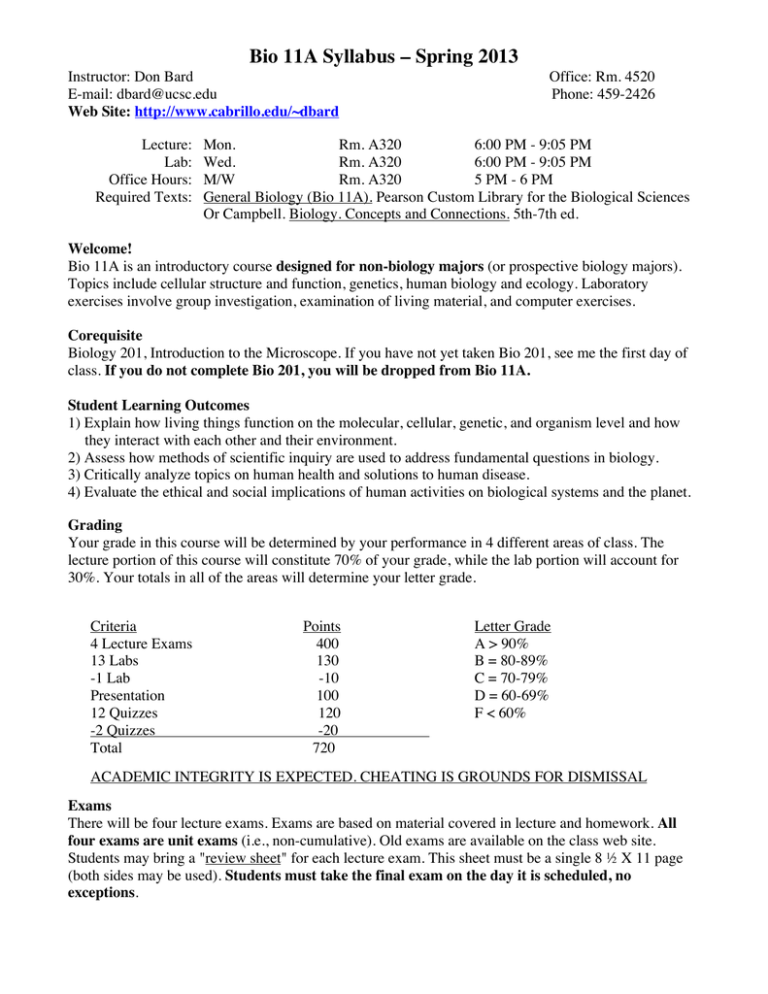Bio 11A Syllabus – Spring 2013
advertisement

Bio 11A Syllabus – Spring 2013 Instructor: Don Bard E-mail: dbard@ucsc.edu Web Site: http://www.cabrillo.edu/~dbard Lecture: Lab: Office Hours: Required Texts: Office: Rm. 4520 Phone: 459-2426 Mon. Rm. A320 6:00 PM - 9:05 PM Wed. Rm. A320 6:00 PM - 9:05 PM M/W Rm. A320 5 PM - 6 PM General Biology (Bio 11A). Pearson Custom Library for the Biological Sciences Or Campbell. Biology. Concepts and Connections. 5th-7th ed. Welcome! Bio 11A is an introductory course designed for non-biology majors (or prospective biology majors). Topics include cellular structure and function, genetics, human biology and ecology. Laboratory exercises involve group investigation, examination of living material, and computer exercises. Corequisite Biology 201, Introduction to the Microscope. If you have not yet taken Bio 201, see me the first day of class. If you do not complete Bio 201, you will be dropped from Bio 11A. Student Learning Outcomes 1) Explain how living things function on the molecular, cellular, genetic, and organism level and how they interact with each other and their environment. 2) Assess how methods of scientific inquiry are used to address fundamental questions in biology. 3) Critically analyze topics on human health and solutions to human disease. 4) Evaluate the ethical and social implications of human activities on biological systems and the planet. Grading Your grade in this course will be determined by your performance in 4 different areas of class. The lecture portion of this course will constitute 70% of your grade, while the lab portion will account for 30%. Your totals in all of the areas will determine your letter grade. Criteria 4 Lecture Exams 13 Labs -1 Lab Presentation 12 Quizzes -2 Quizzes Total Points 400 130 -10 100 120 -20 720 Letter Grade A > 90% B = 80-89% C = 70-79% D = 60-69% F < 60% ACADEMIC INTEGRITY IS EXPECTED. CHEATING IS GROUNDS FOR DISMISSAL Exams There will be four lecture exams. Exams are based on material covered in lecture and homework. All four exams are unit exams (i.e., non-cumulative). Old exams are available on the class web site. Students may bring a "review sheet" for each lecture exam. This sheet must be a single 8 ½ X 11 page (both sides may be used). Students must take the final exam on the day it is scheduled, no exceptions. Labs Labs are normally on Wed eves. Lab handouts are to be printed from the class web site. Pre-lab questions must be answered before lab and are handed in before lab begins for part of the overall lab grade. Typed lab reports are then due one week after each lab is completed. Your lowest lab score will be dropped. Presentations Clasroom presentations will be on a human disease of the group’s choice. They are performed by small groups and members of that group share the tasks of completing the project. Some lab time will be given to working on your presentation. More information about the grading criteria will be provided in class. Quizzes Quizzes will be given in the first 15 minutes of class, 6:05-6:15 PM. They will include multiple choice, fill-in, and short answer questions. Missed quizzes cannot be made up. Your 2 lowest quiz scores will be dropped. Attendance 1. If you miss class for any reason contact me within 24 hours. Make up exams will NOT be given unless I have been contacted within this time and the circumstances leading to the absence are considered valid. Vacation plans or work commitments are not valid circumstances. You can contact me by email, or by phone. Please tell me how and when you can be reached. 2. Active participation will improve your understanding of the material. This includes: discussions; asking questions; working cooperatively; and attending office hours. Extra Credit ALL EXTRA CREDIT IS DUE IN CLASS BY THE LAST WED. NO EXCEPTIONS! Extra credit is available but it needs my prior approval. This includes articles you wish to review. You can receive up to 40 points (3% of your final grade). The amount of extra credit you receive will be based on my evaluation of your work. All written work must be typed, single-spaced, and be at least 2 pages in length. Each report is worth up to 15 points. They must be written in your own words and include a discussion of how it relates to biology and the course material. Examples: 1. Article Review: Choose an article (between 2-3 pages) from a popular science magazine (such as Discover, National Geographic, or Natural History) or science section of a newspaper (e.g. SF Chronicle or NY times) on a biology topic, and write a review of that article (not a summary). A photocopy of the article must be included with your review. 2. Personal Experience Report: Participate or volunteer with groups or agencies that are related to biological issues, such as the environment, disaster relief, blood donation, or recycling. Write a report on the activity, how it relates to biology, and what it accomplished as a public service. Bio 11A - Cabrillo College 2 Spring 2013 Study Tips BE PREPARED TO STUDY 1 TO 2 HOURS PER DAY OUTSIDE OF CLASS. Study Habits: Attend every lecture and lab. Rewrite your lecture notes each week. Take the old exams as if they were real. Do every homework assignment. Create a review sheet for each exam. Students who attend lecture, take good notes, and study, do well in this course. Study Groups: A study group will help you. Come to a group study session prepared by reviewing lecture material on your own first. Then compare notes and test each other on recall. Groups of two to four people often work best. Office Hours: Office hours are when the instructor is accessible without an appointment. Take advantage of them. If you cannot make the times listed, contact instructor about alternative arrangements. Flashcards or other study tools: Learning content-intensive material like biology often requires: seeing, hearing, thinking, and doing. Writing out flashcards (or reorganizing your lectures notes) is a physical activity that can help you process and recall the material. Accommodations All students needing accommodations should inform the instructor ASAP. Veterans may qualify for accommodations. Injured veterans may be entitled to the use of accommodations to ensure equal opportunity for students with verified disabilities. To determine if you qualify or need assistance with an accommodation, please contact Disabled Student Services, Room 810 479-6379, or the Learning Skills Program, Room 1073, 479-6220. Bio 11A - Cabrillo College 3 Spring 2013 LECTURE AND LAB SCHEDULE DATE LECTURES TEXT LABS 2/11-M Intro. to Biology / Atoms 1/2 2/13-W Quiz 1 To Know a Snail 2/18-M HOLIDAY (President’s Day) 2/20-W Molecules / Cells 3/4 2/25-M Quiz 2 Molecular Models 2/27-W 3/4-M 3/6-W Metabolism 5 Quiz 3 Cell Division 8 Test 1 3/11-M Inheritance 3/13-W Quiz 4 3/18-M Molecular Bio / Biotech 3/20-W Quiz 5 3/25-M Nat. Selection Cell Division 9 Genetics 10 / 12 Molecular Biology 13 3/27-W Microorganisms Test 2 4/1-4/6 HOLIDAY (Spring Break) 4/8-M Nat. Selection / Adaptation 13 / 20 4/10-W Quiz 6 Independent Online Lab: Darwin’s Finches 4/15-M Digestion / Circulation 21 / 23 4/17-W Quiz 7 4/22-M Immunity 24 4/24-W Quiz 8 4/29-M Test 3 /Presentation Prep 5/1-W 5/6-M Respiration Presentations-Human Disease Quiz 9 Cane Toad Pop. Ecology 5/8-W Quiz 10 5/13-M Communities 35 / 36 Ecosystem 36 5/15-W Quiz 11 5/20-M Ecosystems / Biosphere Predator-Prey Game 36 / 34 5/22-W Quiz 12 5/27-M 5/29-W Owl Pellet HOLIDAY ( Memorial Day) Conservation Biology 6/3-M Bio 11A - Cabrillo College 38 All extra credit due Test 4 4 Spring 2013



